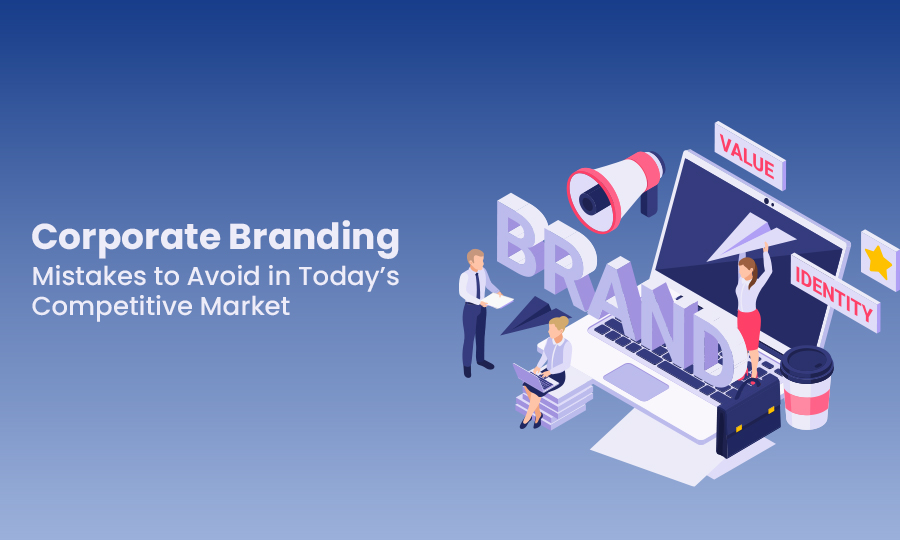A brand strategy aims to deal with the preferences and expectations of the target audience to achieve business goals and objectives by creating a stable brand identity. You might have a set of corporate branding strategies in your deck, but advertising campaigns need some specific approaches to develop brand values and brand identity.
Research shows that between 2020 and 2026, it is expected that digital search and display marketing will increase with a 9% CAGR.
However, in corporate branding efforts, several challenges emerge due to professional mistakes and the lack of visual identity, while brand management becomes complex and difficult in nature. Brand marketing for a corporate entity needs to ensure valuable marketing efforts to develop a strong brand personality.
What is Corporate Branding?
Corporate branding refers to the practice of promoting the brand name of a corporate entity, as opposed to specific products or services. It’s what people see when they think of the company, from the logo, to the values and messaging to the reputation.
A corporate branding image of a company is embedded in marketing ideas and strategies and campaigns, empowered by company personnel and programmes. Corporate branding refers to strategies that promote and shape the corporate brand identity, influencing brand loyalty and visual identity.
A successful brand is deeply motivated by its corporate branding strategy, as the brand identity and brand image play a key role in increasing customer engagement and retention. A corporate branding agency, in this regard, tailors content, product branding efforts and social media posts to increase customer engagement and improve company culture.
Why is Corporate Branding Important?
It was a time when logos and slogans were solely able to draw a significant number of customers and develop a corporate identity.
As the market conditions and target audience have changed on a significant scale, corporate branding reflects a complex structure of marketing strategies to ensure an impressive market reputation. The modern concept of brand identity is coordinated by developing new brand values through digital and social media posts, while customer communication plays a key role in increasing brand values and engaging the target audience.
An effective corporate branding not only promotes products and services, but also empowers brand messaging and brand presence in a certain market.
1. Secure a Strong Market Reputation
First and foremost, check these two market statistics.
- Research shows that 77% of B2B marketers opt for strong branding programmes as the key factor regarding their business success and market growth, while 59% of customers prefer purchasing from familiar companies and brands.
- It is further observed that 81% of customers believe that they cannot purchase any product until they can trust the brand.
A brand voice is nurtured not only by organisational effort to produce the best services and goods, but also by customers’ perception.
In this regard, developing a strong market reputation through online and offline services is important to stay relevant and significant. Moreover, sharing a clear and concise message is important to provide a comprehensive idea about business goals and the advantages of products and services.
Corporate branding extends business opportunities for companies to empower market positions and reputation. A clear understanding of customers’ requirements and preferences can be valuable to improve brand image and brand logo, to create a competitive image in the market.
2. Empowering Brand Equity
The corporate brand identity needs to be facilitated with technological advancements and practices, which can also be advantageous to improve the brand equity.
Corporate branding and brand equity are intertwined, as the latter is the result of effective corporate branding. By ensuring effective corporate branding initiatives, such as cultural alignment, customer communication and sharing comprehensive content, companies can gain an effective reputation on online and offline media platforms.
Moreover, as corporate branding focuses on developing a positive brand perception and image, influencing brand equity and long-term business objectives.
3. Increase Customer Engagement and Retention

A strong corporate branding programme can be advantageous to secure adequate customer engagement and retention, as it can influence customers’ decision-making and preferences regarding products.
You should have a clear idea about your business goals and objectives, and customers’ preferences, while the changes according to the market should be adopted to avoid challenges in the market.
Conveying a clear and concise message is important to communicate with customers. It can be valuable to address their issues regarding products or services. Moreover, a customer journey can be studied in detail to understand customer loyalty and the company’s stand.
Research shows that 52% of customer-centric companies have experienced improved customer engagement and loyalty.
Corporate branding strategies, including cultural support, effective communication and relatable and reliable content, play a key role in enhancing customer loyalty and engagement on a significant scale. As the lack of comprehensive ideas regarding corporate branding affects customer-company relationships, an appropriate brand audit is required to provide better customer service.
4. Empower Customer Experience

In the dynamic global market environment, customers have become the key asset for companies to enhance market share and ensure a strong brand essence. Their marketing materials aim to provide the best customer experience to ensure a high customer engagement and retention rate.
As customer experience plays a key role in shaping business identity and market presence, you should launch positive marketing campaigns to attract customers from different social backgrounds.
However, by promoting relatable and reliable content through corporate branding, you can improve the essence of your brand, following customer journeys.
Research shows that companies that empower personalised services experience a 15% rise in Average Order Value (AoV) and a significant reduction in business service costs.
A consistent corporate branding is essential as it influences customers’ purchasing decisions and product preferences. Moreover, it is also expected from satisfied customers that their recommendations of products and services are more influential for other customers to consider particular brands.
Corporate Branding: A Challenge or Not?
Several modern organisations try to set the best corporate branding examples, but it is not always what it looks like.
A strong corporate brand aims to meet all the touchpoints to establish effective brand values, while the lack of monitoring based on key corporate branding elements affects the branding efforts and programmes. Due to inadequate consistency and digital presence, corporate branding becomes a significant challenge for companies to influence the target audience and develop competitive advantages.
On the other hand, product, as well as service branding, becomes a challenge due to the lack of marketing materials. Moreover, the lack of homogeneity in a company culture affects branding strategies and corporate identity.
Key Mistakes Usually Made in Corporate Branding
Despite technological enhancement and digital branding, professionals make several mistakes, affecting brand reputation and value proposition. The mistakes create numerous corporate challenges and prevent companies from attaining a strong corporate brand identity and brand voice.
1. Ignoring Customer Preferences

As Lauren Freedman said, you cannot succeed without prioritising customers’ requirements and viewpoints, while your brand audit must consider numerous visual elements and the impact of your brand voice.
The corporate ideas and customer-centric activities have evolved on a significant scale, as the key elements, such as the company-customer relationship, communication and personal branding, impact strategies.
Research shows that if customers feel connected to brands, 76% of them tend to buy over a competitor, while 68% of consumers say that brand stories influence their purchasing decisions, respectively. However, 57% of customers tend to spend more with the brand and shop even after a bad experience.
Ignoring customer preferences and choices is a common mistake, as observed among small companies, despite their ideas regarding a unique selling proposition and a well-crafted corporate image. Several brands fail to understand the expectations of customers from products and services. Customer journey and customer experience cannot be ignored if your company aims to ensure a strong corporate branding.
2. Lack of Consistency
The key problem regarding the lack of consistency is portraying a company’s vision and mission statement without professional acknowledgement. Mostly, what happens, brands fail to keep a stronghold over the company’s identity and key metrics, affecting customer loyalty and engagement.
The lack of consistency in corporate branding affects the market agendas, leading to issues regarding brand ideas and requirements. It involves inconsistent social media posts, co-branding, strong corporate brand voice and others, affecting business interests and customer engagement.
However, it also hinders the development of customer trust and visual identity based on the company’s products, enhancing corporate disparities and a cohesive system.
3. Blindly Following the Trends

In many cases, businesses follow the latest advertising fads, which may ultimately damage their corporate image and give brands a dated appearance. Although marketers think marketing trends increase corporate brand, most have caused backlash instead.
It mostly happens due to the lack of infrastructural support and industry knowledge, while the challenges appear at the forefront due to the lack of corporate branding services.
A biased and blind corporate branding reflects the lack of a corporate branding strategy and the lack of customer engagement. If you cannot impress the target audience, your brand strategy does not make any sense.
Let’s check an example.
Time-tested brand logos for Shell, Nike, IBM and CBS have barely changed, but rather followed an enduring design for decades. Among these companies, simplicity in conveying a message through logos has been a common trend, empowering a strong corporate identity. Your company’s brand identity may also be successful in drawing a significant number of the target audience, if you succeed in analysing trends and their necessity before employing.
4. Not Conveying a Clear and Concise Brand Message
In the world of corporate branding, businesses have to make absolutely sure that the brand’s core on products or solutions are very apparent, so that the target audience knows the goals and mission of the business.
The key mistake, as observed, companies focus on presenting every detail of their products and services, while customers lose interest over time. You should provide details regarding two or three key offerings provided by your brand for a successful corporate branding and set corporate branding examples.
However, due to this issue, companies fail to create a strong brand image and product branding.
Don’t forget that you are constantly assessed by your competitors. As corporate branding creates numerous opportunities for companies, it may empower brand image and brand personality. If you fail to create a strong corporate brand strategy, your competitors will get the ground as customers’ expectations and demands move forward.
5. The Lack of Simple Brand Strategy and Brand Audit
Again, SIMPLICITY.
A company’s brand value and market share are deeply driven by customer-based, strong corporate branding. Moreover, the market share, as well as how customers perceive products and services, leads to corporate success and a strong brand reputation.
The most number of brands try to be over-creative for product branding efforts and empowering the brand equity, which leads to nowhere but failure.
One should remember that the world has become more complex and people barely have time to go through broader ideas with minute details. Thus, a corporate branding agency should consider simple and comprehensive strategies to protect business interests and ensure customer engagement on a significant scale.
However, brands often fail to follow the footprint of pioneering companies, which have already used effective marketing materials to emerge as a strong corporate brand. Due to this, several brands fail to incorporate innovative ideas that could foster their brand values and identity, as well as business success.
Research suggests that 77% of consumers prefer to purchase products from brands they follow on social media, while almost 98% of customers follow at least one brand on social media platforms. In this regard, a company needs to incorporate simple social media marketing strategies to improve the value proposition and the company’s brand values.
FAQs
You must be aware of the cultural factors and local trends influencing customers’ decisions and preferences. You should know the key cultural elements, such as language, beliefs and ideas, to ensure better content for branding. Moreover, you can hire local employees with cultural knowledge to ensure a better customer relationship.
Well, that depends. You might find a reliable market condition due to your brand reputation, where corporate branding can be a secondary priority. However, as the market evolves on a significant scale, there is a high chance of facing challenges regarding corporate branding. The changes in customer preferences can also be a threat to your traditional branding programmes.
It depends on your current marketing strategies and their outcome. It might take 2-3 months for MNCs, while in the case of SMEs, it could take 8-12 months.
Conclusion
The changes in customer preferences have rapidly changed the cultural and economic growth of companies in the global market. In this regard, ignoring customer preferences and ideas can lead to trouble, as they have emerged as the key assets of companies.
However, as brand messaging and programmes play a key role in influencing customers’ decisions, you have to be creative and concise to convey branding messages without any boring and demotivating approaches.
Moreover, you cannot optimise your brand reputation and market acceptance without brand audits. You should be aware of the minute details of customers’ approaches towards products and services, as the lack of spontaneity may lead to a lack of customer engagement and interest.
Lastly, the market is too competitive. You have to set an example through corporate branding to remain active and relevant in the rapidly changing market environment. However, if you are unable to address these challenges, you can approach an agency for corporate reputation management to avoid these issues for corporate branding and empower brand identity and recognition with a higher reputation score.
Additional Sources:
- Why CEO Reputation Management Is Crucial for Business Success
- Customer Review Management: Best Practices to Boost Brand Credibility
- Reputation Management for Businesses: Why It’s Crucial in the Digital Age
- Check Web Reputation for Your Business: A Step-by-Step Guide for Businesses

